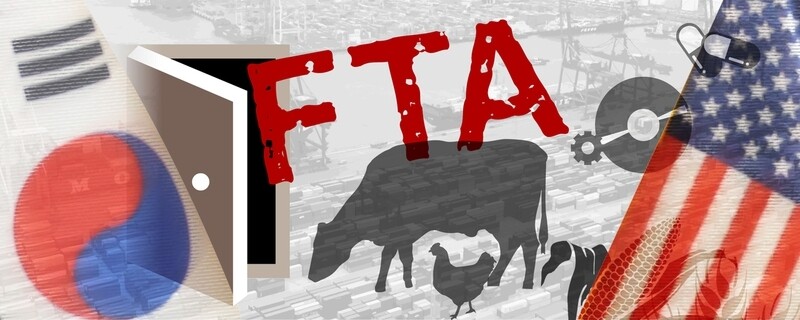hankyoreh
Links to other country sites 다른 나라 사이트 링크
US cites “essential security interests” in its tariffs on South Korean steel and cars

“Essential security interests” are stipulated in the South Korea-US Free Trade Agreement (KORUS FTA) as an exception in investor-state dispute settlement (ISDS) arbitration procedures, it has emerged.
The discovery comes amid a US effort to improve retaliatory tariffs on South Korean steel and imported cars including South Korean models, citing their “national security impact” according to Section 232 of the Trade Expansion Act. Critics are noting the continued “asymmetry,” with the KORUS FTA – newly amended to reflect the two sides’ interests – offering no adequate response measures to an indiscriminate trade offensive by the US.
Articles 23 (General Exceptions) and 23.2 (Essential Security), which were appended to the FTA agreement text on Sept. 4, state that “nothing in this agreement shall be construed [. . .] to preclude a Party from applying measures that it considers necessary for [. . .] the protection of its own essential security interests.”
A footnote to the same article reads, “[I]f a Party invokes Article 23.2 in an arbitral proceeding initiated under Chapter Eleven (Investment) or Chapter Twenty-Two (Institutional Provisions and Dispute Settlement), the tribunal or panel hearing the matter shall find that the exception applies.”
The agreement reached by the two sides when concluding their additional negotiations in 2020 means that an arbitration panel must allow the US measures as an exception even if South Korea requests dispute adjudication for “violation of the international free trade order and norms” in response to the US’s imposition of high additional tariffs and other measures to restrict imports in the interest of “national security.”
While Trump administration trade authorities have used national security as a pretext for playing the Section 232 “trump card,” the KORUS FTA includes a provision allowing it to do so – one that coincidentally bears a similar article number (23.2). Buried away in the FTA text’s 700-plus pages, the passage was not changed in any way during the latest amendment negotiations.
As the “essential security measures” provision shows, the KORUS FTA remains toothless despite its amendments when faced with an indiscriminate onslaught from South Korea’s trading partners in the US – including safeguards on washing machines and solar panels, steel importation quotas, and a national security impact assessment to impose automobile tariffs. In other words, even the alliance framework offers nothing to protect South Korea or check the unpredictable Trump’s trade offensive.
“With South Korea having amply reflected the US’s automobile interests in the amended agreement, we have been consistently maintaining that South Korean automobiles should be exempted from Section 232 tariffs,” a trade official said on Sept. 3.
“As trade issues emerge during the domestic procedures for ratification and implementation of the amended agreement text, we will attempt to locate solutions through bilateral discussions rather than referring them for dispute resolution procedures,” the official said.
The message appeared to signal concerns that with Trump’s “might makes right” approach to trade, a response within the FTA framework would likely result in further demands from the US that would leave South Korea in an even more difficult position.
The same official said it was a “blessing for us that the amendment negotiations concluded with a small package deal rather than escalating further.”
But experts observed that while the FTA negotiations may have concluded without major issues, the threat of Section 232-based automobile tariffs and the ongoing issues plaguing the two sides’ trade relationship outside of the FTA are certain to undermine the KORUS FTA’s stature as a “trade alliance” agreement.
By Cho Kye-wan, staff reporter
Please direct comments or questions to [english@hani.co.kr]

Editorial・opinion
![[Guest essay] The real reason Korea’s new right wants to dub Rhee a founding father [Guest essay] The real reason Korea’s new right wants to dub Rhee a founding father](https://flexible.img.hani.co.kr/flexible/normal/500/300/imgdb/original/2024/0423/8317138574257878.jpg) [Guest essay] The real reason Korea’s new right wants to dub Rhee a founding father
[Guest essay] The real reason Korea’s new right wants to dub Rhee a founding father![[Column] ‘Choson’: Is it time we start referring to N. Korea in its own terms? [Column] ‘Choson’: Is it time we start referring to N. Korea in its own terms?](https://flexible.img.hani.co.kr/flexible/normal/500/300/imgdb/original/2024/0423/3617138579390322.jpg) [Column] ‘Choson’: Is it time we start referring to N. Korea in its own terms?
[Column] ‘Choson’: Is it time we start referring to N. Korea in its own terms?- [Editorial] Japan’s rewriting of history with Korea has gone too far
- [Column] The president’s questionable capacity for dialogue
- [Column] Are chaebol firms just pizza pies for families to divvy up as they please?
- [Column] Has Korea, too, crossed the Rubicon on China?
- [Correspondent’s column] In Japan’s alliance with US, echoes of its past alliances with UK
- [Editorial] Does Yoon think the Korean public is wrong?
- [Editorial] As it bolsters its alliance with US, Japan must be accountable for past
- [Guest essay] Amending the Constitution is Yoon’s key to leaving office in public’s good graces
Most viewed articles
- 1[Column] ‘Choson’: Is it time we start referring to N. Korea in its own terms?
- 2Why Korea shouldn’t welcome Japan’s newly beefed up defense cooperation with US
- 3[Guest essay] The real reason Korea’s new right wants to dub Rhee a founding father
- 4Opposition calls Yoon’s chief of staff appointment a ‘slap in the face’
- 5Senior doctors cut hours, prepare to resign as government refuses to scrap medical reform plan
- 6Terry Anderson, AP reporter who informed world of massacre in Gwangju, dies at 76
- 7[Column] The clock is ticking for Korea’s first lady
- 8[Editorial] Japan’s rewriting of history with Korea has gone too far
- 9New AI-based translation tools make their way into everyday life in Korea
- 10Survey: S. Koreans spend more time using smartphones than eating